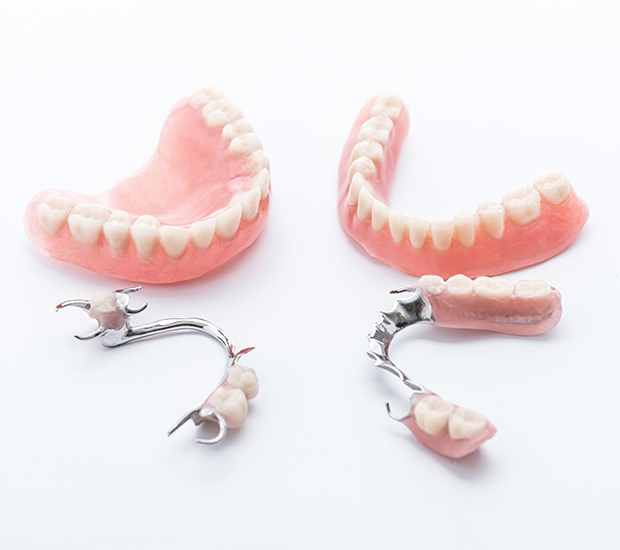Full Dentures
When to Get Partial Dentures
As discussed in an article by the Oral Health Foundation, there are key differences between full and partial dentures. Partial dentures are ideal for patients who have lost multiple teeth but still have healthy natural teeth remaining. This option may also be a wise one for a patient who has several decaying teeth that need to be extracted to prevent the spread of infection and other dental problems. This procedure may also be the right option for patients who are concerned about the cost. Although prices can vary depending on insurance, partial dentures can be an affordable tooth replacement option. Patients worried about pain from a dental procedure may feel eased, knowing that the process is often less invasive than other replacement options.
Getting Full Dentures
Our team will first discuss the benefits and challenges of wearing both dentures and partial dentures. When the patient is ready to begin the procedure for dentures, X-rays and impressions of the person's mouth will need to be made. There will also be a review of the patient's health history, including current medications and recent surgeries. The impressions will go to a lab where a technician makes the full dentures.
The patient will get the apparatus at the following appointment. During this appointment, the doctor will remove any remaining teeth that need to come out, though this can also be done at a prior date. The dental professional will test the dentures to make sure everything fits properly, and the patient feels comfortable with the dentures in the mouth. The dentist may need to make additional adjustments. Be aware, some kinds of dentures can be ready for fitting right after removing teeth, while others require a patient's gums to be completely healed.
Partial Dentures
When to Get Complete Dentures
Everyone should be able to enjoy a comfortable use of their mouth and a bright smile. Going through life without teeth may cause unnecessary hardships. Missing teeth can complicate regular activities such as eating, speaking, and even socializing. Fortunately, dentures can solve this concern. If a patient has lost all teeth, or if a dental professional has pulled them all, the person should consider full dentures. At Advanced Dental Care of Englewood, we can customize the right set of dentures to fit in the person's mouth and provide a natural-looking solution.
Getting Partial Dentures
The process of getting partial dentures is similar, though the apparatus itself has some differences. Partial dentures are connected by a metal framework to secure them in the person's mouth. The dentist will use a fixed bridge to connect the partial dentures to any remaining natural teeth. This type of denture is also removable.
The patient will make two or three appointments to complete this process. Our team will make sure everything fits well and that the patient can have full mouth function with it. Patients should be prepared to wait a few weeks for the dentures. It takes time for the lab technician to make the appliance based on the molds our dental team makes.
What Material Dentures Are Made Of
One of the most popular reasons why people choose dentures and partial dentures are their resemblance to natural teeth. Dentures consist of a gum-colored base, which is often coated with acrylic or plastic. Other materials may be used in modern denture bases, as discussed in an article originally published in the Contemporary Clinical Dentistry. Artificial teeth attach to the base. The teeth are typically composed of porcelain or a resin, such as acrylic. While there are permanent dentures, most are removable, which can help the patient maintain and clean them efficiently.


